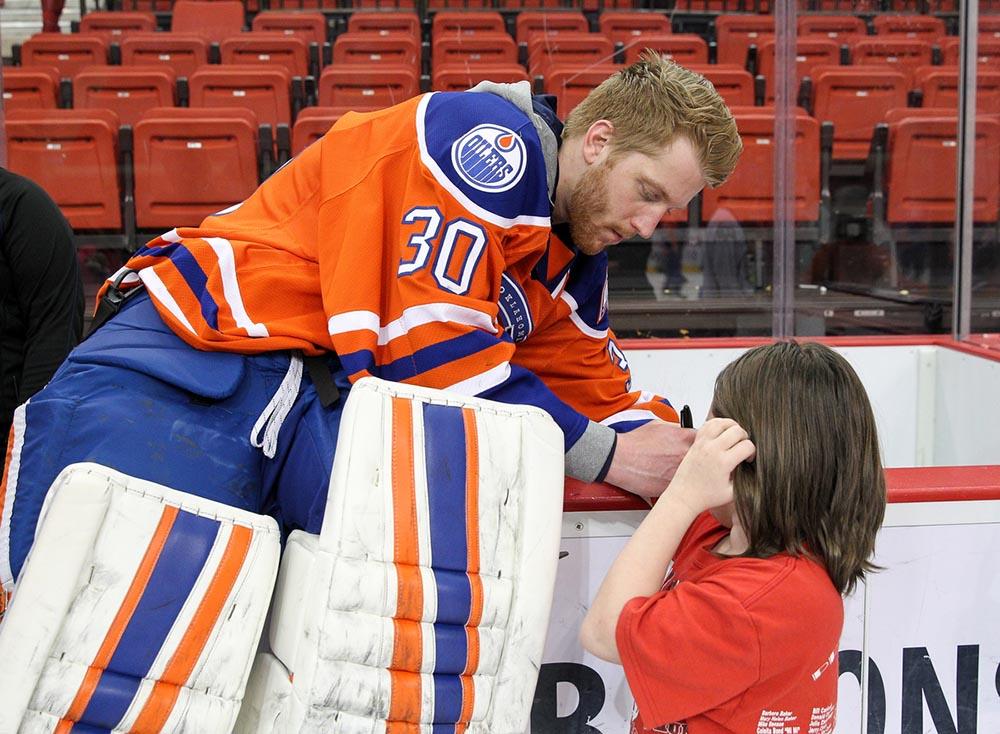by George Darkow | AHL On The Beat Archive
Dropping to his knees, the 22-year-old Bakersfield Condors goalie knew something was terribly wrong. Without waiting for officials to whistle a stoppage in play, the goalie lumbered toward his team’s bench, gasping for air and struggling to find a way to explain what had happened.
In the second period of the Condors’ March 22, 2014 game against the Ontario Reign in Bakersfield, Ontario defenseman Matt Register blasted a shot from just inside the Condors blue line that sailed through traffic and altered the career and life of goalie Tyler Bunz.
“It was a pretty scary situation,” Bunz said. “There was a slap shot from the inside of the blue line through a screen. I didn’t see it and my reaction was to move my head away from the puck. It opened up my throat area, and the shot ended up fracturing my larynx and damaging my vocal chords and voice box.”
Sitting on the Bakersfield bench with the puck still entangled in his gear from the damaging play, Bunz felt as if something in his throat had collapsed. Having difficulty breathing and speaking, Bunz was immediately given a steroid injection to ease the swelling. Minutes later, when Bunz began coughing up blood, he was rushed to a hospital in Bakersfield and then sent about an hour and a half away to Fresno, where ear, nose and throat specialists would better explain the extent of his career-threatening injury.
Doctors told Bunz there was a 1-in-100,000 chance of him not needing surgery in order to survive. Had he been just few years older, the shot would have shattered his larynx and most likely killed him. Bunz’s realization of his injury was alarming. This was something far more serious than the typical bumps and bruises a professional goalie often endures.
“Just laying there – not able to talk, you can’t do anything, you’re pretty much having the nurses do everything for you – and to hear that, it hit close to home and it makes you really realize what you’ve got,” Bunz said.
Amazingly, doctors determined that Bunz would not need surgery and could recover on his own. Without a way to verbally communicate in the early going of his rehabilitation, Bunz kept Bakersfield fans up to date through social media.
Upon hearing the news, Bunz informed fans via his Twitter account: “Good news, no surgery on my neck needed! Get to recover on my own. Thank you all for your kind words and prayers. Definitely a lucky man.”
Two days later, Bunz was released from the hospital, faced with a long road of rehabilitation that extended beyond priming his body for hockey.
For the next several weeks, Bunz was eased back into activities most take for granted – speaking, eating, drinking. At first, he could do little more than sip an occasional cup of tea and work with speech therapists to regain his speech. And aside from the physical rehabilitation he faced, Bunz also had to overcome the mental obstructions a near-death experience can create for a man whose job description requires stopping 95-mile-per-hour pucks with his body.
“Obviously, your first couple skates back after recovery, your mind isn’t too happy about getting in front of the puck again,” he said. “But after a couple practices, I felt good again and I don’t even think about it anymore.”
Now a year removed from the incident, Bunz’s career is back on track. Remarkably, the now-23-year-old has picked up right where he left off, starting the 2014-15 season with the Wichita Thunder of the ECHL and landing with the AHL’s Oklahoma City Barons in December, just eight months after his career hung in the balance.
Despite enduring a potentially life-threatening injury, little has changed in regard to Bunz’s approach to the game. Conducive with Barons head coach Gerry Fleming’s belief that goalies are “of a different breed,” Bunz scrapped the throat guard he wore at the beginning of the season, insisting it was hindering his mobility while joking about his mother’s disapproval of ditching the protective piece of hard plastic.
Though he can vividly recall the event with great detail, Bunz likens the gruesome injury to the occasional setbacks that occur to others in his line of work and insists it’s all part of the job.
“It’s part of the game,” Bunz said. “Injuries always happen, and I don’t consider myself any more special than anyone else who’s gotten hurt. Everyone kind of recovers from things, and that’s what I did as well.”






































